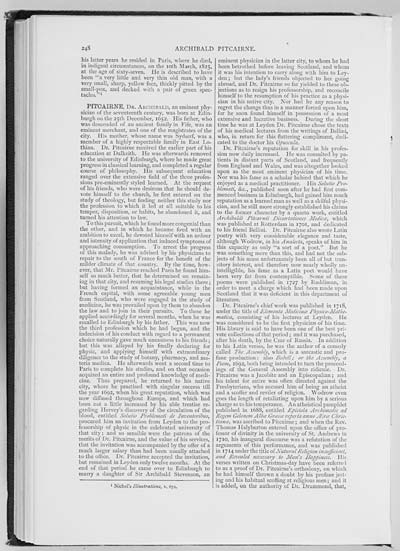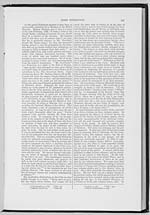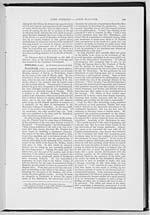Volume 3 > Half-Volume 5
(261) Page 248 - Pitcairne, Archibald
Download files
Individual page:
Thumbnail gallery: Grid view | List view

248 his latter years he resided in Paris, where he died, in indigent circumstances, on the 10th March, 1825, at the age of sixty-seven. He is described to have been "a very little and very thin old man, with a very small, sharp, yellow face, thickly pitted by the small-pox, and decked with a pair of green spec- tacles."1 PITCAIRNE, DR. ARCHIBALD, an eminent phy- sician of the seventeenth century, was born at Edin- burgh on the 25th December, 1652. His father, who was descended of an ancient family in Fife, was an eminent merchant, and one of the magistrates of the city. His mother, whose name was Sydserf, was a member of a highly respectable family in East Lo- thian. Dr. Pitcairne received the earlier part of his education at Dalkeith. He was afterwards removed to the university of Edinburgh, where he made great progress in classical learning, and completed a regular course of philosophy. His subsequent education ranged over the extensive field of the three profes- sions pre-eminently styled learned. At the request of his friends, who were desirous that he should de- vote himself to the church, he first entered on the study of theology, but finding neither this study nor the profession to which it led at all suitable to his temper, disposition, or habits, he abandoned it, and turned his attention to law. To this pursuit, which he found more congenial than the other, and in which he became fired with an ambition to excel, he devoted himself with an ardour and intensity of application that induced symptoms of approaching consumption. To arrest the progress of this malady, he was advised by his physicians to repair to the south of France for the benefit of the milder climate of that country. By the time, how- ever, that Mr. Pitcairne reached Paris he found him- self so much better, that he determined on remain- ing in that city, and resuming his legal studies there; but having formed an acquaintance, while in the French capital, with some agreeable young men from Scotland, who were engaged in the study of medicine, he was prevailed upon by them to abandon the law and to join in their pursuits. To these he applied accordingly for several months, when he was recalled to Edinburgh by his father. This was now the third profession which he had begun, and the indecision of his conduct with regard to a permanent choice naturally gave much uneasiness to his friends; but this was allayed by his finally declaring for physic, and applying himself with extraordinary diligence to the study of botany, pharmacy, and ma- teria medica. He afterwards went a second time to Paris to complete his studies, and on that occasion acquired an entire and profound knowledge of medi- cine. Thus prepared, he returned to his native city, where he practised with singular success till the year 1692, when his great reputation, which was now diffused throughout Europe, and which had been not a little increased by his able treatise re- garding Hervey's discovery of the circulation of the blood, entitled Solutio Problemati de Inventoribus, procured him an invitation from Leyden to the pro- fessorship of physic in the celebrated university of that city; and so sensible were the patrons of the merits of Dr. Pitcairne, and the value of his services, that the invitation was accompanied by the offer of a much larger salary than had been usually attached to the office. Dr. Pitcairne accepted the invitation, but remained in Leyden only twelve months. At the end of that period he came over to Edinburgh to marry a daughter of Sir Archibald Stevenson, an 1 Nichol's Illustrations, v. 671. eminent physician in the latter city, to whom he had been betrothed before leaving Scotland, and whom it was his intention to carry along with him to Ley- den; but the lady's friends objected to her going abroad, and Dr. Pitcairne so far yielded to these ob- jections as to resign his professorship, and reconcile himself to the resumption of his practice as a physi- cian in his native city. Nor had he any reason to regret the change thus in a manner forced upon him, for he soon found himself in possession of a most extensive and lucrative business. During the short time he was at Leyden Dr. Pitcairne chose the texts of his medical lectures from the writings of Bellini, who, in return for this flattering compliment, dedi- cated to the doctor his Opuscula. Dr. Pitcairne's reputation for skill in his profes- sion now daily increased. He was consulted by pa- tients in distant parts of Scotland, and frequently from England and Wales, and was altogether looked upon as the most eminent physician of his time. Nor was his fame as a scholar behind that which he enjoyed as a medical practitioner. His Solutio Pro- blemati, &c., published soon after he had first com- menced business in Edinburgh, had gained him much reputation as a learned man as well as a skilful physi- cian, and he still more strongly established his claims to the former character by a quarto work, entitled Archibalds Pitcarnii Dissertationes Medicce, which was published at Rotterdam in 1701, and dedicated to his friend Bellini. Dr. Pitcairne also wrote Latin poetry with very considerable elegance and taste, although Wodrow, in his Analecta, speaks of him in this capacity as only "a sort of a poet." But he was something more than this, and had not the sub- jects of his muse unfortunately been all of but tran- sitory interest, and therefore now nearly wholly un- intelligible, his fame as a Latin poet would have been very far from contemptible. Some of these poems were published in 1727 by Ruddiman, in order to meet a charge which had been made upon Scotland that it was deficient in this department of literature. Dr. Pitcairne's chief work was published in 1718, under the title of Elementa Medicines Physico-Mathe- matica, consisting of his lectures at Leyden. He was considered to be the first physician of his time. His library is said to have been one of the best pri- vate collections of that period; and it was purchased, after his death, by the Czar of Russia. In addition to his Latin verses, he was the author of a comedy called The Assembly, which is a sarcastic and pro- fane production: also Babell; or the Assembly, a Poem, 1692, both being intended to turn the proceed- ings of the General Assembly into ridicule. Dr. Pitcairne was a Jacobite and an Episcopalian; and his talent for satire was often directed against the Presbyterians, who accused him of being an atheist and a scoffer and reviler of religion. Wodrow even goes the length of retaliating upon him by a serious charge as to his temperance. An atheistical pamphlet published in 1688, entitled Epistola Archimedis ad Regem Gelonem Alba Gracce reperta anno �r� Chris- tiana, was ascribed to Pitcairne; and when the Rev. Thomas Halyburton entered upon the office of pro- fessor of divinity in the university of St. Andrews in 1710, his inaugural discourse was a refutation of the arguments of this performance, and was published in 1714 under the title of Natural Religion insufficient, and Revealed necessary to Man's Happiness. His verses written on Christmas-day have been referred to as a proof of Dr. Pitcairne's orthodoxy, on which he had himself thrown a doubt by his profane jest- ing and his habitual scoffing at religious men; and it is added, on the authority of Dr. Drummond, that,
Set display mode to:
![]() Universal Viewer |
Universal Viewer | ![]() Mirador |
Large image | Transcription
Mirador |
Large image | Transcription
Images and transcriptions on this page, including medium image downloads, may be used under the Creative Commons Attribution 4.0 International Licence unless otherwise stated. ![]()
| Biographical dictionary of eminent Scotsmen > Volume 3 > Half-Volume 5 > (261) Page 248 - Pitcairne, Archibald |
|---|
| Description | Spine title: Half-Vol. V. Macadam to Smith. |
|---|---|
| Description | Volume III. Contains names alphabetically from Macadam to Young. |
|---|

